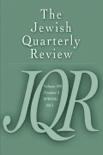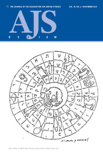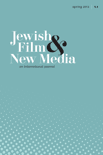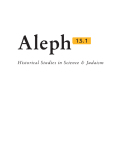
European Judaism-A Journal for the New Europe
Scope & Guideline
Connecting Cultures: Jewish Studies for the New Europe
Introduction
Aims and Scopes
- Dialogical Philosophy and Ethics:
A significant aspect of the journal's focus is on the dialogical philosophy of Martin Buber and its implications for ethics, community, and interpersonal relations. This includes discussions on empathy, dialogic encounters, and the moral dimensions of Jewish thought. - Cultural and Historical Perspectives:
The journal emphasizes the historical and cultural dimensions of Judaism, exploring themes such as Jewish identity, diaspora experiences, and the impact of historical events on contemporary Jewish life in Europe. - Gender and Diversity:
There is a consistent focus on gender issues and the diversity within Jewish communities, highlighting feminist perspectives and the representation of various Jewish identities. - Interfaith Dialogue:
The journal explores the dynamics of Jewish-Christian dialogue, reflecting on historical and contemporary interactions between these faiths and their implications for community building and understanding. - Art and Memory:
A unique contribution of the journal is its engagement with visual arts and memory, particularly how Jewish artists navigate themes of trauma, identity, and heritage through their work.
Trending and Emerging
- Empathy and Interpersonal Relationships:
The concept of empathy, particularly through Buber's lens, has gained traction as an essential theme, suggesting a growing interest in how interpersonal relationships can foster understanding and cooperation within diverse communities. - Impact of Social Media on Dialogue:
There is an emerging focus on the effects of social media on dialogue and community engagement, reflecting the contemporary challenges and opportunities that digital communication presents for Jewish identity and interaction. - Artistic Responses to Trauma:
The exploration of artistic expressions as responses to trauma and memory has become increasingly prominent, indicating a trend towards understanding how visual arts can articulate complex Jewish experiences and histories. - Feminist Perspectives in Jewish Studies:
Feminist dialogues within Jewish studies are on the rise, as evidenced by increased publications that highlight women's experiences and contributions within Jewish narratives, emphasizing the importance of diverse voices in the discourse. - Jewish Identity in Modern Europe:
A renewed focus on the complexities of Jewish identity in contemporary European contexts is emerging, addressing issues of integration, diversity, and the varied experiences of Jews across different European nations.
Declining or Waning
- Psychoanalysis and Judaism:
Earlier publications featured a strong emphasis on psychoanalysis and its intersections with Jewish thought. However, there appears to be a waning focus on this area, as recent issues prioritize other themes such as dialogical ethics and cultural identity. - Traditional Religious Text Analysis:
The analysis of traditional religious texts, while still present, has seen a decrease in frequency. The journal is increasingly leaning towards contemporary interpretations and dialogues rather than classical exegesis. - Historical Narratives of Anti-Semitism:
There has been a noticeable reduction in the focus on historical narratives specifically centered on anti-Semitism. While the topic remains relevant, it seems to be less emphasized in favor of broader discussions on identity and community.
Similar Journals

Artibus et Historiae
Illuminating Visual and Performing Arts ScholarshipArtibus et Historiae is a distinguished academic journal published by IRSA PUBLISHING HOUSE, focusing on the fields of Visual Arts and Performing Arts within the broader scope of Arts and Humanities. With an ISSN of 0391-9064, this journal has become a crucial platform for the dissemination of scholarly research, critical discourse, and innovative ideas in art history and visual culture. Though its coverage in Scopus was discontinued in 2018, it maintained a respectable ranking of #279 out of 502 in its category, placing it in the 44th percentile. This positions Artibus et Historiae as a respected contributor to scholarly conversations in its field. Researchers, professionals, and students will find valuable insights and analyses that deepen their understanding of artistic practices and historical contexts. While not an open-access journal, it aims to bridge the gap between academia and broader audiences interested in the dynamic interplay of art and history.

JEWISH QUARTERLY REVIEW
Charting New Territories in Jewish StudiesJewish Quarterly Review, published by University of Pennsylvania Press, is a distinguished academic journal that delves into the multifaceted realms of Jewish culture, history, and religious studies. With a rich publication history dating back to 1953 and an impressive track record of rigorous scholarship, this journal maintains a Q2 ranking in key categories such as Cultural Studies, History, and Religious Studies in 2023, placing it among the top-tier journals in its field. The ISSN number 0021-6682 and the E-ISSN 1553-0604 ensure that its scholarship is widely accessible and traceable in academic databases. While the journal is not open access, it remains an essential resource for researchers, professionals, and students seeking in-depth analysis and perspectives on Jewish thought and heritage. The JQR is known for its editorial commitment to enhancing understanding and dialogue across cultural and historical contexts, making it an invaluable asset for anyone engaged in Jewish studies and related disciplines. With its headquarters in Philadelphia, PA, the journal continues to foster scholarly engagement and critical discourse on Jewish identity and experience through its carefully curated articles and reviews.

AJS Review-The Journal of the Association for Jewish Studies
Bridging Disciplines for a Comprehensive Understanding of Jewish StudiesAJS Review - The Journal of the Association for Jewish Studies is a leading academic journal published by the University of Pennsylvania Press, dedicated to advancing scholarship in Jewish studies. With its ISSN 0364-0094 and E-ISSN 1475-4541, the journal offers a rich compendium of research from various disciplines, including cultural studies, history, literature and literary theory, and religious studies. Recognized within the Q2 and Q3 quartiles across multiple categories in 2023, AJS Review provides an esteemed platform for academics to disseminate innovative ideas and engage with critical issues relevant to Jewish history and culture from 1976 to 2024. Although not an open-access journal, it ensures that high-quality, peer-reviewed articles are available to a global audience, enabling researchers, professionals, and students to foster deeper insights into Jewish narratives and heritage. By promoting interdisciplinary dialogue, AJS Review is integral to the academic community, offering valuable contributions to our understanding of Jewish studies and its broader implications.

Jewish Film & New Media-An International Journal
Celebrating Innovation in Jewish Film Studies and Media AnalysisJewish Film & New Media: An International Journal, published by Wayne State University Press, serves as a crucial platform for scholars and practitioners within the realms of Film Studies, Jewish Studies, and Media Studies. Since its inception, the journal has explored the intersection between Jewish culture and cinematic representation while also addressing contemporary media narratives. With an ISSN of 2169-0324 and E-ISSN 2169-0332, it is indexed in major databases, showcasing solid rankings in various disciplines, including a commendable Q2 rank in Visual Arts and Performing Arts. Despite its current Q4 categorizations in Anthropology and Communication, the journal is noted for its engaging contributions that sow rich discussions about Jewish identity, filmic expression, and media representation. Researchers and students alike benefit from the journal’s wealth of interdisciplinary scholarship, which spans converged years from 2013 to 2017 and 2019 to 2022, ensuring a robust timeline of critical inquiry. As an essential resource for understanding the nuances of Jewish film and new media, this journal occupies a unique niche, inviting contributions that push the boundaries of current academic dialogue.

Arquivo Maaravi-Revista Digital de Estudos Judaicos da UFMG
Empowering Research in Jewish StudiesArquivo Maaravi-Revista Digital de Estudos Judaicos da UFMG is a distinguished open-access journal dedicated to the field of Jewish Studies, published by the Universidade Federal de Minas Gerais (UFMG). With an ISSN of 1982-3053, the journal has been serving the academic community since 2007, facilitating the dissemination of research and scholarship in Jewish cultural, historical, and religious studies. Situated in the vibrant academic landscape of Brazil, the journal aims to foster dialogue among researchers, professionals, and students, providing a platform for innovative and critical perspectives. Although the H-Index and specific Scopus ranks are not available, the journal's commitment to academic rigor and open access ensures that its content reaches a broad audience, empowering researchers and enriching the field of Jewish studies worldwide. The journal is based at FAC Ciências Econômicas, Av. Antonio Carlos, 6627, Belo Horizonte MG 31270-901, Brazil, making it an integral part of the UFMG's academic ecosystem.

Journal for the Study of Judaism
Fostering Dialogue in the Study of JudaismJournal for the Study of Judaism, published by BRILL, serves as a vital platform for scholarly discourse in the fields of History, Literature and Literary Theory, and Religious Studies. With a commendable impact factor and ranking in the Q2 and Q3 quartiles across its respective categories, this journal facilitates high-quality research that explores the multi-faceted dimensions of Jewish studies from its inception in 1970 to the present day. For those who engage with the journal, the commitment to rigorous peer-review processes ensures publication of significant articles that advance knowledge and foster discussions within the academic community. As an essential resource for researchers, professionals, and students alike, the journal continues to enrich the understanding of Judaism through esteemed contributions of scholarship and critical analysis. The journal’s rich legacy and commitment to excellence make it an indispensable tool for those seeking to deepen their insight into Jewish studies and its broader implications.

Aleph-Historical Studies in Science & Judaism
Navigating the Intersections of Knowledge and BeliefAleph-Historical Studies in Science & Judaism, published by Indiana University Press, is a pivotal journal at the intersection of history, religious studies, and the philosophy of science. With an ISSN of 1565-1525 and an E-ISSN of 1565-5423, this journal has gained recognition for its insightful exploration of the complex relationships between scientific practice and Jewish thought from 2009 to 2023. Operating from the heart of the United States, Aleph currently holds a Q4 category ranking in History, History and Philosophy of Science, and Religious Studies, reflecting a growing interest in its unique contributions to these fields. Notably, it ranks within the 79th percentile in Arts and Humanities History and Religious Studies, underscoring its significance in advancing scholarly dialogue. Although currently not an Open Access journal, it remains an essential resource for researchers, professionals, and students dedicated to uncovering the narratives that shape our understanding of science and religion.

Zutot
Unveiling New Insights in Religious and Cultural StudiesZutot is a distinguished academic journal published by BRILL, focusing on the multifaceted realms of Arts and Humanities, Cultural Studies, and Religious Studies. With ISSN 1571-7283 and E-ISSN 1875-0214, Zutot presents an invaluable platform for scholars seeking to explore innovative ideas and interdisciplinary approaches within these fields. Recognized within the Q4 category for its contributions to contemporary discourse, the journal ranks at the 44th percentile in Religious Studies and the 39th percentile in General Arts and Humanities, underscoring its relevance and the quality of research it publishes. Since its inception, Zutot has continued to facilitate critical dialogue and scholarship, thus acting as a crucial resource for researchers, professionals, and students alike. Its converged publication years from 2001 to 2004 and 2008 to 2024 further demonstrate its ongoing commitment to supporting rigorous academic inquiry.

Images
Unveiling the Power of Visual NarrativesImages, published by BRILL, serves as a significant academic platform within the realms of Cultural Studies, History, Religious Studies, and the Visual Arts and Performing Arts. With its ISSN 1871-7993 and E-ISSN 1871-8000, this journal is committed to providing a scholarly forum that engages with the complexities of visual representations and their impact on cultural narratives. Though it currently holds a Q4 category ranking across various fields, indicating room for growth, its presence in Scopus rankings showcases its contribution to the arts and humanities, positioning it as a unique voice in interdisciplinary discourse. The journal aims to publish innovative research that fosters dialogue among scholars, practitioners, and students interested in the intersections of visual culture and societal dynamics. Despite its non-open access status, Images remains a vital resource for those seeking to understand the intricate fabric of cultural expressions from historical and contemporary perspectives, offering insights that resonate across academic and artistic landscapes.

Tradition-A Journal of Orthodox Jewish Thought
Bridging Past Wisdom with Present ChallengesTradition: A Journal of Orthodox Jewish Thought is a prestigious academic journal published by the Rabbinical Council of America, dedicated to the exploration and analysis of Orthodox Jewish thought and its implications on contemporary issues. With a legacy dating back to 1973, this journal serves as a crucial platform for scholars, theologians, and students interested in the rich tapestry of Jewish philosophy, law, and ethics. Although it does not offer open access, its thoughtful, peer-reviewed articles are essential for advancing knowledge in Jewish academia and fostering dialogue within the broader cultural context. As an authoritative voice in the field, Tradition invites submissions that challenge, inform, and inspire further inquiry into the complexities of Jewish tradition, ensuring that it remains at the forefront of scholarly discussion.